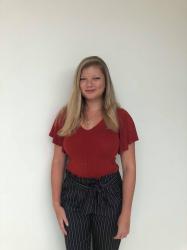Many students may think they’re in the right major but find out later that their ideal career or major wasn’t what they thought it was. Others may be unsure about what they want to study at all.
Adam Martin, the Assistant Director of Career Development for the Office of Career and Professional Development, provided insight on what students should do now to start preparing for the future.
Are You in the Right Major?
“Oftentimes what we’ve found is that students sometimes will choose a major without fully understanding what’s entailed in that major,” Martin said.
Martin brought up an instance from his own life: “When I was 18, I thought being a lawyer was going to be amazing and that’s everything I wanted to do, but it was because of fictionalized versions like T.V. shows … it wasn’t until I started to do the leg work and dig into that a little bit that I realized that’s not a great fit for me.”
The Office of Career and Professional Development has the Major & Career Exploration center, where students learn more functional components like how to research majors and careers and are shown to understand resources available, Martin said.
Career and Professional Development has options on the Major & Career Exploration webpage including self assessment, career assessment, and evaluating your choices.
Martin suggests that students do the research and discover what the career they’re interested in is actually about. He recommends students go beyond the initial excitement to determine if they like their major and the classers they’re going to take or if they only like the idea of it.
“Do that research whether its on the academic side of things, whether it’s on the career side of things, to try to find these little bits of information,” Martin said.
What Can You Do With Your Major?
On the Career Services website, there’s a section titled “What Can I do With a Major In…” This includes description of the major, link to department website, occupational opportunities, Possible Employment Settings, Internet Resources, Professional Organizations/Associations and Student/Campus Organizations, according to the Career and Professional Development website.
Simply click your college and your major.
Department Website
Each major has their own department website. While each varies, it includes specific information for the major as well as some other resources.
For example, computer science includes specific experiential learning opportunities and research areas.
Course Catalog
“Just a little thing of just look at the course catalog, of what it’s going to take to get this degree. Do I even like it now? Or is this a time where I to need sort of reevaluate,” Martin said.
For example, if your major is in English, type “ENGL” in the subject section, and you can see all available courses available for the semester.
Class Options
There are two class options offered: Career Exploration (GSU 2131) and Professional Development Seminar (GSU 2132).
Along with exploring career options, Career Exploration “will also assist students in identifying the steps needed to gain professional experience and polish the skills required to be successful in their chosen career path,” according to the Career and Professional Development website.
The Professional Development Seminar is a course “designed for students interested in developing highly desired ‘soft skills.’”
Informational Interviews
Conduct an informational interview.
In an informational interview, students “learn about responsibilities and tasks associated with the person’s career and have the opportunity to ask questions about the knowledge, skills, talents and level of education required for the job,” according to the Career and Professional Development website.
Ideally, students should talk to someone already in that profession and start to leverage their own professional network, Martin said.
Martin encouraged students not only to find out what they like but also what they wish they knew before they started the job.
Martin has a masters in professional counseling, and he used this to bring up his own experience, “Getting into it, I didn’t realize maybe how much of that job was paper related and report writing and all those kinds of things.”
Martin said the Office of Career and Professional Development does their best to try to connect students with resources in the local community whether they’re doctors or lawyers, but they also encourage students to utilize professors.
Martin said they also has candid career, a resource for students who don’t know someone in profession or their profession isn’t something local to them.
“It’s basically Youtube almost for informational interviews. They can go on there and type in keywords about different professionals and hear people provide descriptions about those things that they like, things they dislike,” Martin said.
“At the end of the day, what we want is students that are graduating with majors that are exciting to them with career prospects that match up well with … their values and interests,” Martin said.





